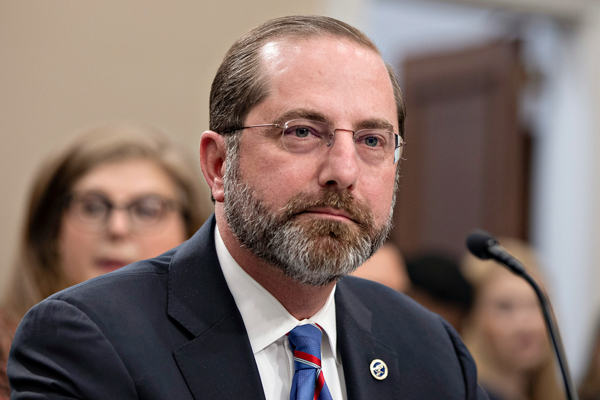Department of Health and Human Services (HHS) Secretary Alex M. Azar II testified before House and Senate lawmakers this week on the president’s fiscal year (FY) 2021 budget request [see Washington Highlights, Feb. 14] and the administration’s response to the coronavirus outbreak.
In a dayslong marathon of hearings on Capitol Hill, Azar appeared before the House and Senate Appropriations Subcommittees on Labor, Health and Human Services, Education and Related Agencies (Labor-HHS); the House Energy and Commerce Subcommittee on Health; and the House Ways and Means Committee.
Lawmakers raised several concerns during the hearings about proposed cuts to biomedical research and health care workforce programs, as well as changes to Medicaid and the 340B Drug Pricing Program.
Senate Appropriations Labor-HHS Subcommittee Chair Roy Blunt (R-Mo.) and Ranking Member Patty Murray (D-Wash.) criticized the HHS budget request for proposing cuts to the National Institutes of Health (NIH) and the Centers for Disease Control and Prevention.
Chairman Blunt pointed to the subcommittee’s past investments in medical research, public health preparedness, and health workforce programs.

“We're not likely to cut health care research [in FY 2021] and I hope we can continue our pattern of increasing health care research at this incredible time,” Blunt said.
House Appropriations Labor-HHS Subcommittee Chairwoman Rosa DeLauro (D-Conn.) and Ranking Member Tom Cole (R-Okla.) shared their enthusiasm for their subcommittee’s efforts to support NIH-funded research and repeated the message conveyed by Senate appropriators that cutting funding to the world’s premier research agency would be unwise.
On broader budgetary issues, Cole contended, “Continued cuts to discretionary spending will not solve the nation's fiscal problems, period. It's not possible to balance our national budget by chipping away at discretionary spending. We must look to broader entitlement reform to achieve the valued goal of a balanced budget.”
During the hearings, members emphasized the need to fund the Health Resources and Services Administration (HRSA) workforce programs.
“At a time when our nation is facing a health professional shortage, this budget proposes cutting nearly $800 million from programs that support tuition assistance, loan forgiveness and training for several hundred thousand health professionals annually,” Sen. Murray said.
In an exchange with Azar during the House hearing, Rep. Cheri Bustos (D-Ill.) questioned the proposed budget cuts to the HRSA Bureau of Health Workforce. She asked Azar how HHS “will square that massive cut with ending provider shortages, or at least addressing provider shortages, especially in rural America.”
In his response, Azar highlighted how the National Health Service Corps “lets us, through tuition reimbursement, get nurses, doctors, dentists – through a reimbursement system – to serve in rural communities and underserved areas.”
House committee members also highlighted concerns about the impact the proposed Medicaid Fiscal Accountability Regulation (MFAR) would have on Medicaid patients and state budgets during both the Energy and Commerce and Ways and Means hearings. Rep. Terri Sewell (D-Ala.) said health care in Alabama would be decimated by the proposal.
Rep. Schrader pointed out, “The proposed rule says the fiscal impact to the Medicaid program from the implementation of the proposed rule is unknown.” He asked the secretary, “Do you consider that to be a comprehensive regulatory impact analysis?”
Azar replied, “I haven’t looked at the [regulatory] impact analysis there so I don’t know the specifics on that but certainly I do want to assure you that we are hearing the feedback from you and others and governors about this.”
Also, during the hearing, Rep. Larry Bucshon, MD, (R-Ind.) asked Azar about the 340B Drug Pricing Program. Azar reiterated the administration’s proposal for Congress to give HRSA regulatory authority over the program so that it can have audit authority.
Energy and Commerce Health Subcommittee Chair Anna Eshoo (D-Calif.) added, “Just for the record, HHS has existing oversight authority of 340B and it’s my understanding that HRSA has conducted 1300 audits of the program.”